#Mit Brennender Sorge
Explore tagged Tumblr posts
Text
L'ascesa di Hitler e il prezzo pagato dai cattolici
A 90 anni dalla nomina di Hitler a Cancelliere del Reich. Della pericolosità del nazionalsocialismo se n’era resa conto fin da subito la Chiesa cattolica tedesca che pagò un altissimo prezzo per questa resistenza: 310 sacerdoti tedeschi furono internati nei campi di concentramento, 65 morirono durante la prigionia, altri 36 furono giustiziati o assassinati. Numeri che stridono con la Chiesa…

View On WordPress
3 notes
·
View notes
Text
Pio XI enc. Mit brennender sorge 14.3.1937 sulla purezza della dottrina cattolica in Germania e nel mondo
Ricorda bene che: “Appartiene al loro sacro ministero di fare tutto il possibile, affinché i comandamenti di Dio siano considerati e praticati quali obbligazioni inconcusse di una vita morale e ordinata, sia privata sia pubblica; i diritti della maestà divina, il nome e la parola di Dio non vengano profanati; le bestemmie contro Dio in parole, scritti e immagini, numerose talvolta come l’arena…
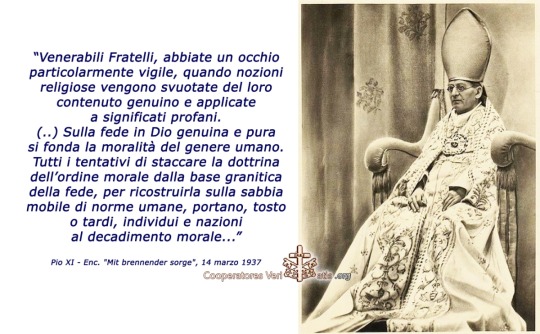
View On WordPress
#apostasia#Comandamenti#concordato#diritto naturale#dottrina#eresia#etica#germania#Mit brennender sorge#morale#Pio XI
0 notes
Text
Carta Encíclica Mit Brennender Sorge del Papa Pío XI, donde la Iglesia condenó al nazismo.
Papa Pío XI (desde 1922 hasta su muerte en 1929). CARTA ENCÍCLICAMIT BRENNENDER SORGEDEL SUMO PONTÍFICEPÍO XISOBRE LA SITUACIÓNDE LA IGLESIA CATÓLICA EN EL REICH ALEMÁN A los venerables hermanos,arzobispos, obispos y otros ordinarios de Alemaniaen paz y comunión con la Sede Apostólica 1 . Con viva preocupación y con asombro creciente venimos observando, hace ya largo tiempo, la vía dolorosa de…
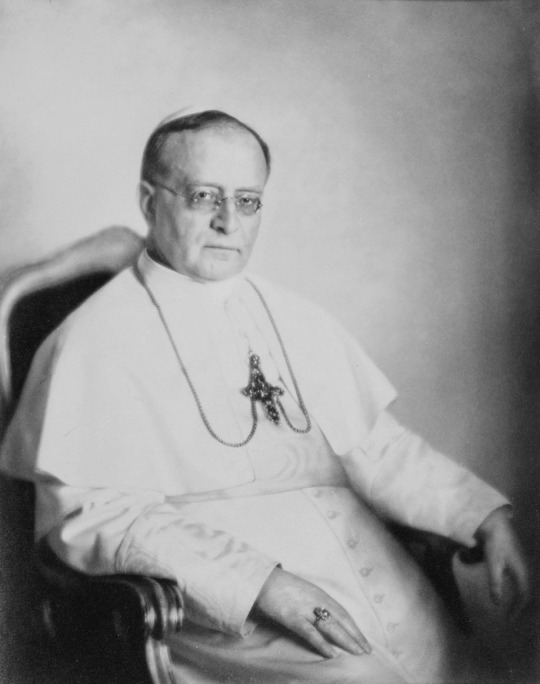
View On WordPress
1 note
·
View note
Text
Just saw some fucking fascist nonsense under the “Catholic” tag (as in they literally tagged it with “fascism”) and I would just like to take this moment to remind everyone that you cannot be a fascist and a good Catholic at the same time.
Reject fascism, friends. They are not our allies, not even if you’re a trad. Our tradition is not a dead one, but a living and life-giving one. Fascism is nothing more than the hollowed-out, rotting carcass of a “tradition” that is long dead and should be left in the grave where it belongs.
#(And of course it’s no surprise that every family in their little 1950s fever-dream montage was white.)#catholic#catholicism#antifascist catholics#may the spirit of Pius XI come and scourge you with the spines of Mit Brennender Sorge and Non Abbiamo Bisogno in the night#repent and believe in the gospel#CCC 2113
79 notes
·
View notes
Text
White Nationalism isn’t a traditional Christian value.
From Pope Pius XI’s Mit Brennender Sorge:

released on March 14, 1937, 25 years before Second Vatican Council
#Catholic#Christianity#Traditional Catholic#Nazism#White Nationalism#White Supremacy#Pope Pius XI#politics
87 notes
·
View notes
Text
not-so-friendly reminder to so-called “catholic nazis”, that Hitler literally executed approximately 3,000 polish catholic priests over the course of the war for the crime of existing, 1,800 of which were executed in the concentration camps themselves, with the stated goal of squeezing the religion out of poland. He stated in his letters that he despised the teachings of the Church, and wanted it out of his territory. He established the Hexenkartothek, a sub-division of the SS explicitly founded to produce anti-catholic pro-pagan propaganda and promote witchcraft, which was overseen by Heinrich Himmler. He was an apostate who worked with pagans and heretics to murder millions of innocent people in the name of a blatantly secular regime, and he should have been burned at the stake.
oh yeah, not to mention that nazism was effectively condemned in Encyclical Mit Brennender Sorge by Pope Piux XI and Cardinal Eugenio Pacelli (later Pope Pius XII, meaning nazism was actually condemned by two popes in a row), meaning that if you are a “catholic nazi” you are every bit as heretical as a “pro-abortion catholic” or a “catholic communist”.
355 notes
·
View notes
Text
Aus Neugier hätte ich eine kleine Frage und Umfrage für euch. 🥰 Nach den ersten kleinen Eindrücken, die ihr von boaf, den Familien und Pair-Optionen erhalten habt, interessiert es mich brennend, welche Konzept ihr bisher am interessantesten findet. Keine Sorge! Die Umfrage ist anonym und ihr müsst auch nicht kommentieren, wenn ihr am interessantesten findet. Ist auch nur eine Umfrage aus Neugierde, eure 1. oder 2. Wahl könnt ihr mit Beginn der mmff auch immer noch ändern (i mean, ich sehe ja sowieso nicht, wer wie abgestimmt hat. 😂)
10 notes
·
View notes
Text
Our God is the Personal God, supernatural, omnipotent, infinitely perfect, one in the Trinity of Persons, tri-personal in the unity of divine essence, the Creator of all existence. Lord, King and ultimate Consummator of the history of the world, who will not, and cannot, tolerate a rival God by His side.
Pope Pius XI, Mit Brennender Sorge
#catholic#catholicism#pope pius xi#file under caroline#honestly I know this isn’t the point of the encyclical but it is a great summary of our beliefs
15 notes
·
View notes
Text
The relationship between the Catholic Church and the Third Reich was complex and fraught with tension. Initially, the Vatican sought to maintain a diplomatic relationship with Nazi Germany, hoping to protect the interests of the Church and its followers. In 1933, the Reichskonkordat was signed, which was a treaty between the Holy See and the German government. This agreement aimed to safeguard the rights of the Church in Germany, but it also led to compromises and criticisms regarding the Church's stance on Nazi policies.
As the Nazi regime became increasingly oppressive, particularly towards Jews and other marginalized groups, the Catholic Church expressed concerns about the regime's ideology and practices. Many bishops and clergy were vocal in their opposition to the Nazis, although the Church as an institution often struggled with how to respond effectively without incurring further repression.
One significant document that emerged from this tension was the papal encyclical "Mit brennender Sorge," issued by Pope Pius XI in 1937. The encyclical was notable for its strong condemnation of Nazi ideology, particularly its racist and anti-Semitic elements. It emphasized the importance of human dignity and the moral law, criticizing the regime for its totalitarian tendencies and the way it undermined the Church's authority.
"Mit brennender Sorge" was notable for being written in German and was directly addressed to the Catholic faithful in Germany. It called on Catholics to uphold their faith and moral principles in the face of the regime's violations of human rights. The encyclical was read from pulpits across Germany on Palm Sunday, making it a significant act of defiance against the Nazi regime.
In summary, while the Catholic Church initially sought to negotiate and coexist with the Third Reich, the increasing atrocities and moral issues associated with the Nazi regime led to a more confrontational stance, as exemplified by "Mit brennender Sorge." This document highlighted the Church's commitment to human dignity and moral integrity in the face of totalitarianism. The relationship ultimately became one marked by conflict, especially as the Church aimed to protect its community and uphold its teachings in a rapidly deteriorating political landscape.
0 notes
Text
instagram
Geschmackssache ist ja bekanntlich alles, oder? 😉 Aber mal ehrlich, schaut euch dieses Bild genauer an: Würde es euch nicht auch brennend interessieren, worum es sich dabei handelt? 🔍 Keine Sorge, ich lass euch nicht länger zappeln. Es ist... trommelwirbel... eine Tapete. Ja, richtig gehört! 🎨 Diese atemberaubende Kreation habe ich neulich im Baumarkt entdeckt. 😍
Stellt euch mal vor: Ein Raum, vielleicht mit einem alten Sekretär mit einer nostalgischen Schreibtischlampe, einem loderndem Kamin, vollgestopft der Raum mit Bücherregalen, und DANN diese Tapete als Akzent an der Wand? 📚🖼️ Einfach perfekt, oder? Natürlich muss man sie nicht lieben... aber ich tue es. 😏 Und ja, ich würde sie mir kaufen – weil es einfach sein müsste. 🎯
0 notes
Note
Is Catholicism comparable with eugenics
Yes, absolutely, but apparently almost no one understands how, because they treat eugenics as a dirty word that just means hating and killing people for their skin color/disabilities/sexual proclivities (not Catholic!), rather than understanding eugenics as what it actually is: an inevitable part of the development of the human race.
Catholics (like G. K. Chesterton and his "Eugenics and Other Evils") have been some of the strongest and most vocal opponents to eugenics. If you're Catholic, you have to believe in monogamous marriage, not using birth control or performing abortions, not gene-editing people, not gassing people, and so on. And that's all well and good. So in this shallow sense, the answer is almost always given as 'No'. But in the strict sense, that 'No' is totally misplaced...
What many do not realize is that it was actually the Catholic Church ITSELF that directed at least one, and debatably two or more, of the largest and most successful eugenics programs in all of human history, to the great benefit of all mankind. One was the genetic pacification of Western European states in the Middle Ages, when, under the auspices of the Church, they started hanging violent criminals instead of simply fining them. Law and order, rigorously applied over long periods of time, is itself a eugenic process as such, because you weed out individuals with high aggression and low impulse control - and the Church, to its credit, helped impose that law and order. (nb: you don't need to kill people for this to work, just make it a little harder for them to swim in the gene pool. I think sterilization & penal labor is a more Christian sentence than the death penalty, and I think many caths would agree...)

The other great Catholic eugenics program is the breeding of the Ashkenazi Jews for intelligence. This was accomplished through Catholic laws forbidding usury, which, combined with Jewish laws allowing usury and discouraging intermarriage, had obvious selection effects for Jewish intelligence. Some of my antisemite followers will get mad at me for saying this but even if you don't like Jews, those niggas gave us a lot of inventions n sheeit, so credit where credit is due. See chapter 7 of this book (also by Henry Harpending) for the full argument.
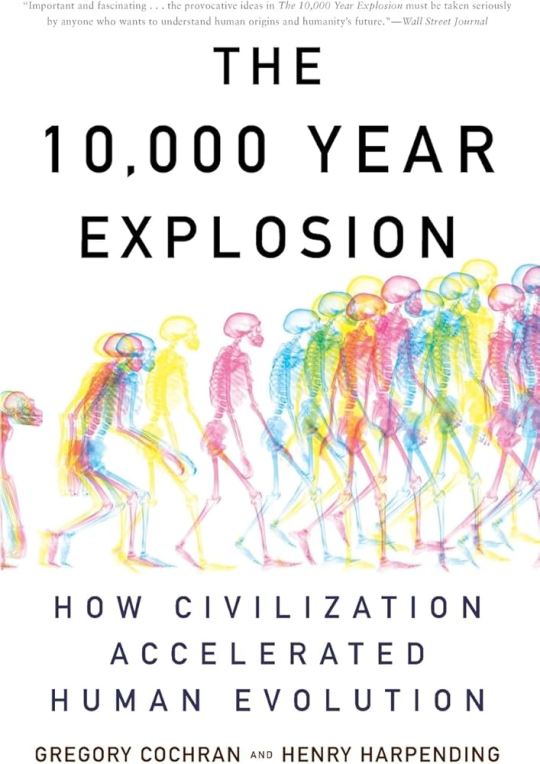
For a more formal, official Catholic answer or to fact check me, check out Dignitas Personae: On Certain Bioethical Questions, and a lot of Pius XII's encyclicals on Nazi matters, like Humani Generis ('we're all one human family, guys'), Summi Pontificatus, ("The Church hails with joy and follows with her maternal blessing every method of guidance and care which aims at a wise and orderly evolution of particular forces and tendencies having their origin in the individual character of each race, provided that they are not opposed to the duties incumbent on men from their unity of origin and common destiny... A disposition, in fact, of the divinely sanctioned natural order divides the human race into social groups, nations or States, which are mutually independent in organization and in the direction of their internal life. But for all that, the human race is bound together by reciprocal ties, moral and juridical, into a great commonwealth directed to the good of all nations and ruled by special laws which protect its unity and promote its prosperity.") and Mit Brennender Sorge ('don't gas your Jewish neighbor, guys').
1 note
·
View note
Text
Imponderabilidade das Forças Metafísicas

As forças físicas podem ser medidas com exatidão. E sua trajetória e duração pode-se predizer, porém as forças metafísicas são imponderáveis. Poderia se afirmar que estas são forças de um plano superior que ocasionalmente se materializam no nosso.
As forças físicas do hitlerismo eram insignificantes em relação às forças que se lhe opunhavam dentro e fora da Alemanha. Primeiro se creu que Hitler não chegaria ao poder, e logo que ascendeu a chancelaria – baixo a presidência de von Hinderburg – se teve a certeza de que sua queda era iminente e que seria um triunfo comunista.
Foi um milagre de equilíbrio, de tato, de audácia precisa, de franqueza, que atraía a uns e desconcertava ao inimigo, o que foi apoiando a situação de Hitler como chanceler. Detrás de suas forças físicas, relativamente reduzidas, borbulhavam forças metafisicas que iam superando obstáculos e atraindo vontades.
Hitler foi diretamente às bases visíveis do adversário ou inclusive aos redutos mais ocultos.
Cortou de um golpe o capitalismo especulativo, o que explora e engana, ou seja, o supercapitalismo, porém sem danificar o autêntico capitalismo, o que presta um bem social como fator de produção e progresso. A propriedade privada podia se desenvolver com canais morais.
Como consequência do anterior, aumentaram os centros de trabalho e os investimentos. A massa de seis milhões de desempregados começou a diminuir rapidamente e o nível de vida do trabalhador começou a subir. Em cinco anos a produção duplicou.
A economia do Estado se canalizou a reforçar a produção da iniciativa privada, não a suplantá-la mediante a absorção dos meios de produção. Desta forma, se praticava um socialismo autêntico, tendente a melhorar a sociedade, não o enganoso socialismo marxista, que ao absorver a iniciativa privada, não melhora ao povo, senão que unicamente aumenta seu próprio poder político.
No campo trabalhista, Hitler liquidou a danosa luta de classes entre trabalhadores e patrões. Em vez dessa dualidade, estabeleceu a convergência de classes ao bem comum do todo. Dissolveu aos grupos líderes (em sua maioria com vínculos internacionais comunistas) e suprimindo o capital especulativo fez possível que o trabalhador laborasse identificado com seu patrão, mediante salários justos e tratamento decoroso. Síndicos trabalhistas da Frente de Trabalho fixavam os salários de acordo com as possibilidades de cada empresa. Ao patrão, era exigido responsabilidade sobre o bem-estar de seus empregados e trabalhadores. Para evitar a inflação (alta desenfreada de preços) cuidava-se que o aumento de salários fosse proporcional ao aumento da produção.
Sobre a agricultura, se proclamou que “a ruína do camponês alemão seria a ruína do povo alemão”. As fazendas até 125 hectares foram declaradas propriedades hereditárias que não podiam ser objeto de hipoteca nem leiloadas por dívidas. Mediante o estímulo aos preços agrícolas, aumentou-se a produção para que a Alemanha se abstecesse de provisões, coisa que se logrou em 83%.
A respeito da ameaça comunista, Hitler a tratou como tal. O marxismo não era uma ciência econômica nem uma ciência social, como fingia para se camuflar, senão uma conspiração internacional. Portanto, proibido o Partido Comunista alemão e toda propaganda marxista. Dizia que uma sociedade sã combatia aos criminosos sem discutir com eles.
No campo religioso, Hitler precisou que sua doutrina era um sistema político que nada tinha que objetar com as crenças religiosas e concluiu uma concordata com o Vaticano. Anos depois o Papa Pio XI condenou vários pontos do nazismo em sua encíclica Mit brennender Sorge. Concretamente dizia que os valores de “raça, ou o povo, ou o Estado, ou a forma de governo ou quaisquer outros valores básicos da configuração social humana” não deveriam se converter “na norma máxima de todos os valores” porque isto “inverte e distorce a ordem das coisas tal como foi criado e mandado por Deus” (N.T.: Vale destacar, que apesar dessas críticas pontuais, a Igreja Católica jamais condenou ao Nacional-Socialismo como um todo, enquanto que o mesmo papa Pio XI em sua carta encíclica Divinis Redemptoris classifica ao comunismo como “intrinsecamente perverso” e que com ele “não se pode admitir em campo nenhum a colaboração”).
Para com a imprensa, o rádio, o teatro e a literatura em geral, Hitler estabeleceu uma censura publicamente anunciada. Em vez da hipócrita “liberdade” que em muitos países era realmente censura vergonhosa, secreta, estabeleceu uma censura visível, pública. Suprimiu-se, por exemplo, a nascente campanha antinatalidade de diários e revistas, pois Hitler dizia que uma guerra matava “um fragmento do presente”, mas que o controle de natalidade na Europa “mata mais gente que todos os que caíram nos campos de batalha, desde os tempos da Revolução Francesa até nossos dias”.
Também se proibiu a pornografia impressa, teatral ou cinematográfica, as publicações homossexuais, as distorções da arte, etc. Em uma cerimônia pública foram queimados folhetos, revistas e livros como os de Sigmund Freud, criador da psicanálise pan-sexualista. “A cerimônia de hoje – disse Goebbels, a 10 de maio de 1933 – é um ato simbólico. Ela demonstrará ao mundo que o fundamento da República de novembro de 1918 já está destruído para sempre. Deste monte de cinzas surgirá a Fênix de um novo espírito”.
No ramo da política internacional, Hitler acabou fulminantemente com o Tratado de Rapallo, do qual a URSS vinha se beneficiando. Em troca disso, buscou e obteve uma aproximação com a Polônia. O chefe polaco Pisuldski se inclinava a formar uma aliança germano-polaca frente à URSS. No sul, Hitler se reuniu com Mussolini e pôs as bases para um tratado germano-italiano oposto ao comunismo internacional. (Este tratado se denominaria depois Eixo Berlim-Roma e se ampliaria com a inclusão do Japão).
A respeito da revolução que Röhm (NT: Ernst Röhm, chefe das SA) ansiava para dar uma inclinação socialista-esquerdista ao nacional-socialismo, Hitler celebrou uma reunião com chefes da SA e da SS e advertiu: “Asfixiarei todo intento de perturbar a ordem existente tão implacavelmente como esmagarei a chamada segunda revolução, que somente conduziria ao caos”… Sobre as pretensões de estabelecer controle oficial sobre as empresas privadas, despojando aos donos, e de confiscar as grandes lojas comerciais, especificou: “A história não nos julgará se destituímos e encarceramos ao maior número de economistas, mas se logramos ou não proporcionar trabalho… As ideias do programa não nos obriga a destruir tudo e a atuar como loucos, senão a considerar nossos pensamentos prudente e cuidadosamente”.
O outro propósito de Röhm, de converter a SA em uma milícia nacional sob seu comando, em vez do exército sujeito a normas tradicionais de honra, justiça e cavalheirismo, foi desautorizado por Hitler, que precisou que o exército seria a força armada da nação e que a SA (forças de assalto) a esse deveria se submeter.
Hitler sabia que no alto mando do exército havia vários generais que ansiavam derrubá-lo. Uma de suas primeiras atividades como chanceler foi reunir a 400 altos chefes militares e falar a eles de sua doutrina. Em parte, persuadiu a muitos com seus argumentos e os fez seus partidários, ainda que nada logrou com aqueles que secretamente eram células de infiltração. Por outra parte, aproveitou a seu favor o cuidado que os oficiais tinham a respeito da enorme força da SA que Röhm estava armando. De um modo ou de outro, Hitler logrou um certo apoio do exército, apesar dos chefes deste, que somente esperavam um momento propício para derrubá-lo.
Como Röhm persistia em seus planos, em 30 de junho de 1934 foi detido e executado, junto com 71 dos chefes fanaticamente aderidos à ele. Por certo que causou grande surpresa que entre os conjurados com Röhm se encontrava o Dr. Erich Klausener, presidente da Ação Católica de Berlim, que se suicidou ao ver-se descoberto. Röhm era inimigo de toda religião e queria suprimir o culto.
O general Schleicher, ex-ministro da Defesa e ex-chanceler, antigo protetor do Tratado de Rapallo, se mostrava muito confiante e dizia indiscretamente que Hitler não viveria muito. Havia entrado em tratos com Röhm para derrubar a Hitler. O general von Bredow também se encontrava comprometido neste plano. Dias depois da morte de Röhm, Schleicher e Bredow foram liquidados pela Gestapo. Se disse que apresentaram resistência quando iam ser presos. O exército não protestou porque Schleicher era visto com suma desconfiança devido os seus planos de criar na Alemanha uma milícia ao estilo dos soviets.
O general Hammerstein, chefe do exército, muito próximo a Schleicher, chamado de o “general vermelho” e recalcitrante adversário de Hitler, foi substituído do mando, aparentemente por haver chego à idade limite.
O ancião presidente Hindenburg deu seu apoio moral a todo o anterior e felicitou a Hitler.
Desta forma, em pouco menos de um ano e meio desde que subiu à chancelaria, Hitler evitava perigos mortais para seu regime e consolidava sua posição.
Ao mesmo tempo, os comunistas viam que o que haviam julgado impossível estava fazendo-se possível e que não chegava o caos que pouco antes consideravam iminente. Cada dia era mais difícil desencadear o que eles mesmos chamavam de o dilúvio comunista.
O fracasso vermelho repercutiu nos grossos muros do Kremlin.
Tradução livre e adaptação por Viktor Weiß
Fonte: Infiltración Mundial, Salvador Borrego. Capítulo: Imponderabilidad de las Fuerzas Metafísicas
0 notes
Text


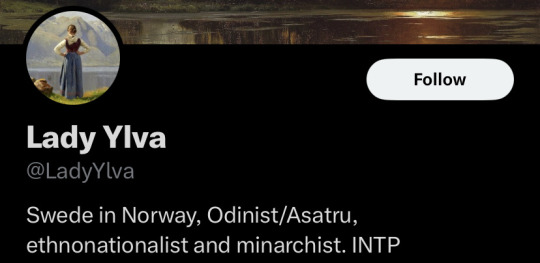
Idk if I was able to convince this person. I mean if someone’s entire worldview revolves around preserving an earthly kingdom it’s hard to explain to them how people can dedicate their lives for the sake of the kingdom hereafter.
I’m not saying that nationalism is incompatible with Christianity (I’ve written about it here), just that this idea that propagation of one’s race as the basis for morality and public policy as oppose to the eternal laws of God is incompatible with Christianity.
“Whoever exalts race, or the people, or the State, or a particular form of State, or the depositories of power, or any other fundamental value of the human community - however necessary and honorable be their function in worldly things - whoever raises these notions above their standard value and divinizes them to an idolatrous level, distorts and perverts an order of the world planned and created by God; he is far from the true faith in God and from the concept of life which that faith upholds.”
Pope Pius XI, Mit brennender Sorge
8 notes
·
View notes
Text
None but superficial minds could stumble into concepts of a national God, of a national religion; or attempt to lock within the frontiers of a single people, within the narrow limits of a single race, God, the Creator of the universe, King and Legislator of all nations before whose immensity they are "as a drop of a bucket".
-Pope Pius XI, from the encyclical Mit Brennender Sorge (With Deep Anxiety)
3 notes
·
View notes
Text
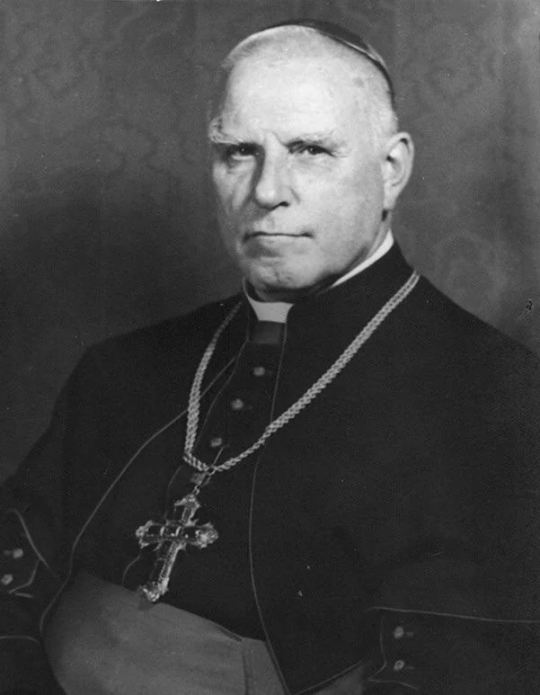
Clemens August Graf von Galen, el obispo católico alemán que resistió abiertamente el régimen nazi (c. 1940) Cuando Galeno fue consagrado obispo, eligió el lema episcopal Nec laudibus, nec timore (“no vencido ni por el miedo ni por la adulación”). Galeno condenó el "culto a la raza" nazi en una carta pastoral de 1934 y asumió la responsabilidad de la publicación de una colección de ensayos que criticaban ferozmente al ideólogo nazi Alfred Rosenberg y defendían las enseñanzas de la Iglesia católica. Fue un crítico abierto de ciertas políticas nazis y ayudó a redactar la encíclica antinazi Mit brennender Sorge del Papa Pío XI de 1937 . En 1941, von Galen pronunció tres sermones en los que denunció el arresto de jesuitas, la confiscación de bienes de la iglesia, los ataques nazis a la Iglesia y, en el tercero, condenó ferozmente el asesinato en masa aprobado por el estado en el marco del programa de eutanasia de personas con discapacidad mental. o defectos físicos (Aktion T4). Los sermones circularon ilegalmente en forma impresa, inspirando a algunos grupos de la Resistencia alemana, incluida la Rosa Blanca. Galen sufrió prácticamente arresto domiciliario desde 1941 hasta el final de la guerra. Los documentos sugieren que los nazis pretendían ahorcarlo al final de la guerra. En una charla de 1942, Hitler dijo: "El hecho de que guardo silencio en público sobre los asuntos de la Iglesia no es en absoluto malinterpretado por los astutos zorros de la Iglesia católica, y estoy seguro de que un hombre como el obispo von Galen sabe muy bien que después de la guerra me vengaré hasta el último cuarto".
0 notes
Text
Der Untergang des Hauses der Drachen III: Der Tanz der Drache
House of the Dragon-A/B/O-Fic
Fortsetzung der Fics „Der Untergang des Hauses der Drachen“ und „Der Untergang des Hauses der Drachen II: Brennender Absturz“
Status: Fertiggestellt.
Anmerkung: Spielt im selben Multiversum wie meine anderen A/B/O-Fic aber auf einer anderen Erde.
Warnings: Spoiler für „Fire and Blood“ bzw. die Staffel 2 von „House of the Dragon“, Gewalt und Sex, Mittelalterliches Setting, A/B/O-Dynamik, Sexismus, Homophobie, Misshandlungen und Missbrauch,Vergewaltigung, Polygamie, PTSD, Verstümmelung, Rassismus, Fanatismus, Panikattacken, und sehr viel Character Death etc. -> alle schlimmen Dinge, die im Canon passieren auch hier.
Pairings: prinzipiell Canon-Pairings sowie ein paar andere: besonders wichtig sind Daemon/Rhaenyra, Harwin/Laenor, vergangenes Rhaenyra/Laenor/Harwin, Aegon/Jace, Jace/Baela, Jace/Baela/Aegon, Aegon/Helaena, Aemond/Helaena, Aemond/Alys Rivers und Daeron/ Addam
Namensproblematik: Da die deutsche Version von „Feuer und Blut“ mit der selben Hintergrundidee geschrieben wurde wie die erste Übersetzung vom „Lied von Eis und Feuer“, wird diese hier vollkommen ignoriert. Die deutsche Fassung der Serie wird auch oft genug von mir ignoriert werden, da ich die Eigennamen von Menschen in ihrer englischen Originalfassung belasse, außer im Falle der Bastardnachnamen. Ortsnamen hingegen werde ich übersetzen wie in der deutschen Fassung.
Inhalt:
Nach einem schmerzhaften Verlust will Rhaenyra Targaryen die wahre Thronerbin ihren Anspruch mit Feuer und Blut verteidigen. Doch sie ist nicht der einzige Omega, den der Tanz der Drachen dazu bringt soweit zu gehen wie es notwendig sein sollte.
Die Erben des Hauses des Drachen bekämpfen sich untereinander, nichts ahnend, dass sie dabei die Zukunft von ganz Westeros riksieren und einer ihnen unbekannten Verschwörung direkt in die Hände spielen.
Leseprobe:
„Gebt mir meinen Omega zurück. Das war die Forderung von Aemond I. Targaryen an seine Halbschwester und seinen Onkel gewesen, nachdem er ihren Sohn überfallen, vergewaltigt, entführt und auf diese Weise getötet hatte. Als ob er noch irgendetwas fordern könnte. Seinen Omega-Bruder Aegon würde er nie wiedersehen, dafür würde Rhaenyra schon Sorge tragen. Und seine Omega-Schwester Helaena und deren Kinder, sie würde nicht zulassen, dass diese weiterhin in den Händen dieses Monsters blieben. Aemond hatte ihr Luke genommen, dafür würde Feuer und Blut auf ihn herabregnen.
Ihr eigener Alpha, ihr Gefährte, ihr Onkel Daemon war nach Lukes Tod verschwunden. Er kehrte mit einem verbissenen Gesichtsausdruck zurück und erklärte: „Ein Sohn für einen Sohn. Ich habe mich darum gekümmert. Die Hightower-Schlampe wird erfahren wie es sich anfühlt.“ “
Lest weiter:
Links:
#Fanfiction#house of the dragon#a/b/o verse#Der Untergang des Hauses der Drachen III: Der Tanz der Drachen#omega rhaenyra#Alpha Daemon#Alpha Aemond#Beta Alicent#Jace/Aegon#Daeron/Addam
0 notes